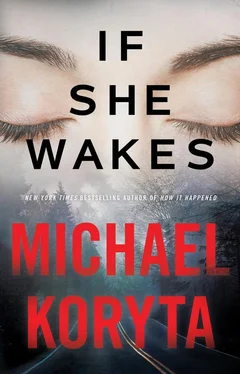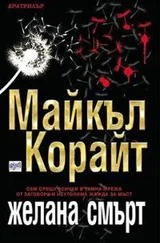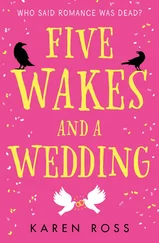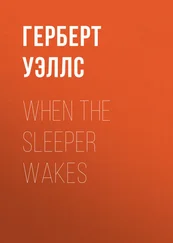This may be her last chance to have a voice in them.
“I did win one battle,” Shannon says, turning back to her with a sniff and that forced smile. “They usually use some crappy black-and-white film. I told them that my sister hates black-and-white. They didn’t like the idea of changing, but I can be persuasive.”
An understatement for the ages. She could still sell tickets for the Titanic, Rick had once said of Shannon.
“So I got to pick the film,” she continues, squeezing Tara’s hand. “And I’ll give you one guess what I picked.”
Something scary, Tara thinks. Shannon loves Tara’s fear of horror movies, the way even the cheesy ones can make her jump, how she covers her eyes and watches them through her fingers.
“That’s right,” Shannon says, “your test will be a familiar one. You get to watch Jaws. ”
Well, now. Tara has long proclaimed Jaws to be the most re-watchable movie in history. She hasn’t anticipated that being put to a coma test, though.
“You’ll respond,” Shannon whispers. “I know you will. When Quint starts talking about the Indianapolis sinking or when Chief Brody realizes his own son is on the sailboat by the shark, you’ll respond. Just to the dumb music, you’ll respond.” She’s imploring now, a hint of desperation to her words that scares Tara. This test is going to be very important.
“The people at the lab were encouraging,” Shannon says, seemingly more to reassure herself than anything else. “They’ve had good results.” She pauses. “Maybe I won’t mention where I got the idea.”
As Abby drove Hank’s Tahoe along the turnpike, she remembered that she’d already spent some time considering life as a fugitive, thanks to Luke. One of his first leads in anything that wasn’t a purely over-the-top action film where spiders fought robots was in a movie about a husband-and-wife team on the run, a Hitchcock knockoff that bombed at the box office. While he was reading the script and rehearsing, though, he enjoyed pondering the scenario.
“It’s so much harder now than it would have been fifty years ago,” he’d said, stretched out on the chaise longue on their cramped balcony during one of the rare hours that sunlight fell on it. “Think about it — you could pay cash for hotel rooms and rental cars and plane tickets, there were pay phones everywhere and no surveillance cameras, and you could hot-wire a car with a screwdriver.”
Abby interrupted and asked him to explain that process, to tell her just how he’d go about hot-wiring a car with a screwdriver in the good old days. Luke smiled. “That was the golden age of hot-wiring! Simple! But the newer cars are tougher.”
“Oh?”
“Yes.” He’d nodded emphatically. “Just trust me on this.”
“Certainly.”
“The first thing you’d have to do if you were running from the law or people who were trying to kill you is ditch the cell phone, obviously,” he went on. “They can always track those. But it’s easy to get a burner phone — if you have cash. Credit cards are no good, right? And how many people have enough cash to go on the run? How much cash do you have in your wallet right now?”
Abby had four bills crumpled in her purse — and she was pleasantly surprised to discover one of them was a ten. She’d thought they were all singles.
“So there you go, thirteen dollars,” Luke said. “I couldn’t get far on that. They’d find me before I hit the state line. I’d run out of gas—”
“Is this in the car you hot-wired with a screwdriver?” Abby asked, and he grinned. For all of his physical beauty — and he was stunning, no question about that — he had a kid’s smile, awkward and shy, and his off-the-set laugh was the same, a little too big, too high, far too likely to end with a helpless snort. Abby loved that about him. All the surprising touches that turned the movie star into a human being were reassuring. The more human he became, the more she loved him. That first day, when he’d joked to her about the grief his friends were giving him for having a woman perform his stunt driving, she’d thought he was exactly what she’d expected: good-looking and charming and arrogant and false. The first date, she’d asked herself why she was wasting her time. But soon she realized that her initial wariness about him was understandable, but it was not the truth. The truth was complicated, as it usually is, and the truth of Luke London made him easier to love than Abby wanted. Her truth was that she wanted to stay far away from actors. Her truth was that she was breaking rules for him.
“Sure it’s the car I hot-wired,” he said of his escape vehicle. “Because I’d have found an old car, right? As we discussed.”
“Ah, of course.”
“But then I run out of gas, and I’ve got no cash. What then? Pretend to be a homeless person?”
“It doesn’t sound like it would be pretending by then.”
Her pointed at her, sculpted triceps flexing under his T-shirt. “Good point! It would be method acting at its finest.”
“And you suck at that.”
He nodded thoughtfully. “Indeed. I’d stand out, and they’d find me.”
“Who?”
“The people who are trying to kill me! So what do I do?”
“You steal,” she said.
“I’d get caught. I guarantee it. I have a naturally guilty disposition when it comes to crime. One try at shoplifting, and I’m getting caught and going to jail. Which means, obviously, another inmate will be paid to kill me. Or maybe a guard. But going to jail is not hiding.”
“You steal carefully, then,” Abby had said. “Maybe break into a house. Just a matter of finding the right place.”
Now, two years after that conversation and months after they’d taken Luke off life support, Abby drove along the turnpike and wondered where the right place was.
She had some cash — a hundred and thirty bucks, enough for a hotel room somewhere, but hotels were dangerous. Her face was going to be on the news, and this was off-season in Maine, which meant that the employees of hotels that took cash were going to have time to pay attention to their guests, learn their faces.
That was when she got it.
Off-season. The right places, she realized, were plentiful. They didn’t call the state Vacationland for nothing — most people who owned property in Maine didn’t stay there year-round. There were thousands of vacant houses, cabins, and cottages out there for her, and plenty of them were isolated.
She left the interstate in Augusta and moved on to the back roads. She realized only after taking the exit that the other cars hadn’t made her uneasy, nor had the speed. Her mind was too busy with a real crisis to let the imaginary threats creep in. When you were fleeing a murder scene and a murderer, a traffic accident suddenly didn’t seem too bad.
As she followed one of the winding country roads east toward the coast, it began to rain again. That felt good, like protective cover. She was driving east because most of the summer people clung to the coast. There were exceptions at every lake and pond, of course, but nowhere was the population of seasonal houses higher than the Midcoast. When the patio furniture was moved into storage and the lobster shacks folded up their bright umbrellas, the population of those towns fell by at least half.
How to pick the right house, though? Driving around some little coastal village and staring at houses would allow her to identify a few vacant ones, but it would also get her noticed by a year-round resident.
She stopped at a gas station with a lunch counter, a place busy enough for her to feel like she wouldn’t stand out and big enough for her to suspect they’d have what she needed. Her clothes had dried but were still covered with mud, and she didn’t want many people to get a look at her. She waited until an older couple got out of their car and headed toward the door, and then she got out of the Tahoe, crossed the parking lot swiftly, and walked in on their heels. They turned toward the deli counter, and Abby stepped behind one of the merchandise racks and pretended to be looking at candy while she looked around the store. Just beside the door, she saw what she wanted — a rack of real estate guides, free of charge.
Читать дальше






![Майкл Корита - Те, кто желает мне смерти [litres]](/books/396555/majkl-korita-te-kto-zhelaet-mne-smerti-litres-thumb.webp)





